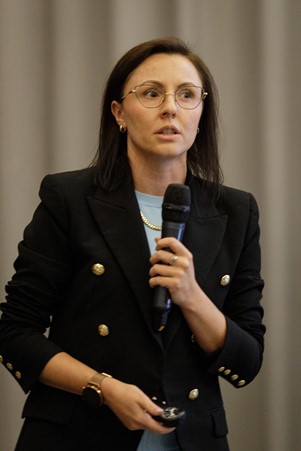
Eng53rd WEFTA Conference, 13th-17th October 2025, Gdańsk, Poland
Keynote Speakers

Fot. P. Manasterski
Prof. Eng. Ewelina Jamróz
Prof. Ewelina Jamróz, DSc, Eng. is a distinguished expert in agricultural sciences with extensive research and teaching experience. She completed her MSc in Agriculture with a specialization in Agroeconomics at the University of Agriculture in Krakow in 2010, and simultaneously earned her BSc in Horticulture with a specialization in Horticulture and Marketing in 2011. In 2013, she completed postgraduate studies in chemistry education at the Faculty of Chemistry, Jagiellonian University in Krakow. In 2014, she was awarded a PhD in agricultural sciences in the field of agronomy, specializing in environmental protection, defending a dissertation on the synthesis and application of biodegradable furcellaran-protein complexes. In 2020, she obtained her postdoctoral degree (habilitation) in food and nutrition technology, based on her scientific achievement titled “Assessment of the Effect of Active and/or Intelligent Components on the Functional Properties of Polysaccharide and Polysaccharide–Protein Films.” In 2025, she was awarded the title of Full Professor in the discipline of food and nutrition technology.
Since 2015, she has been affiliated with the University of Agriculture in Krakow, where she began and continues her academic and research career in the Department of Chemistry. Since 2022, she has also been employed at the Department of Commodity Packaging at the Cracow University of Economics. Her research interests focus on biopolymers and their applications, particularly:
- biopolymer-based furcellaran films with active and intelligent properties,
- biologically active biopolymer hydrogels,
- biopolymer emulsions enriched with active peptides,
- micro- and nanocapsules as carriers for bioactive compounds.
She is the author of over 90 scientific publications in top-tier JCR-listed journals and the principal investigator of numerous national and international research projects.
The presentation will provide a comprehensive overview of the research on innovative biopolymer-based packaging materials conducted under Prof. Jamróz’s supervision. It will begin with monolayer furcellaran films, a unique approach on a global scale, using furcellaran as the primary film-forming matrix. In later research phases, furcellaran was combined with proteins (e.g., gelatin, whey protein) and polysaccharides (e.g., chitosan, starch) to produce active films enriched with functional ingredients. These were divided into three categories:
- protein hydrolysates (e.g., derived from carp skin),
- aqueous plant extracts (e.g., green tea, yerba mate, rosemary),
- nanofillers (e.g., silver and selenium nanoparticles, graphene oxide).
The resulting materials exhibited antimicrobial, antioxidant, and indicator properties, including the ability to inform about the quality status of the packaged food. Their effectiveness was confirmed through in vitro tests and practical applications, including packaging of mackerel, salmon, carp, mini kiwi, blueberries, linseed oil, cottage cheese, and ham.
Due to limitations such as high water vapor permeability in monolayer films, the next research stage involved the development of multilayer films. As part of the LIDER XI project (NCBiR), Prof. Jamróz developed advanced multilayer structures based on furcellaran, chitosan, gelatin hydrolysates, and active additives such as silver nanoparticles, montmorillonite, curcumin, and capsaicin. These materials demonstrated enhanced functionality and were successfully applied to packaging for products such as mackerel, butter, and tofu.
The latest phase of her research focused on creating a comprehensive, biodegradable packaging system consisting of a flexible bilayer film and a rigid tray made from biomass waste (e.g., green tea brewing residues). This innovation embodies the principles of circular economy and zero waste. The packaging, developed under the “Total Biodegradable Packaging” project, effectively extended the shelf life of salmon by two days and significantly reduced microbial growth.
This presentation will summarize Prof. Jamróz’s achievements in designing functional, sustainable biopolymer-based packaging materials and outline future directions in the development of active and intelligent packaging systems utilizing food industry by-products.

